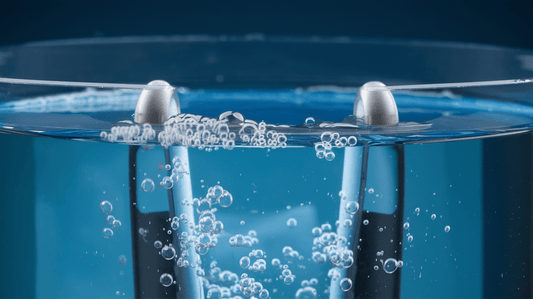Hydrogen Inhalers vs Hydrogen Water Generators
Updated
John Smith
Researcher & Writer
Our Commitment to Accuracy and Objectivity
Ocemida is committed to delivering reliable and unbiased information. Our editorial team, comprised of experienced editors and medical experts, meticulously reviews every article and guide to ensure the content is accurate, up-to-date, and free from bias.
Rigorous Fact-Checking Process
To uphold the highest standards of accuracy, we adhere to the following fact-checking guidelines:
Trusted Sources: We only cite reputable sources, such as peer-reviewed journals, government reports, academic and medical associations, and interviews with credentialed healthcare professionals.
Evidence-Based: All claims and data are supported by at least one credible source. Each article includes a comprehensive bibliography with full citations and links to the original sources.
Internal Linking: While we may include internal links to other relevant Ocemida pages for better navigation, these links are never used as primary sources for scientific information.
Expert Review: A member of our medical or scientific expert team provides a final review of the content and cited sources for all articles and product reviews related to medical and health topics.
By following these rigorous standards, Ocemida strives to provide readers with reliable and informative content.
Share with a friend
Hydrogen therapy has gained momentum in the wellness industry, praised for its antioxidant, anti-inflammatory, and neuroprotective properties. Two primary vehicles for delivering this therapy exist – hydrogen inhalers and hydrogen water generators. But how do these two methods measure up against each other? This comprehensive guide delves into hydrogen inhalers and hydrogen water generators, comparing their functionalities, benefits, and efficiency.
What are Hydrogen Inhalers?
Hydrogen inhalers are specialized devices engineered to produce and dispense considerable amounts of hydrogen gas. The hydrogen is then directed through a silicone tube to a nasal cannula for users to inhale. The minute size of the hydrogen molecule allows it to pass through the walls of these specially designed silicone tubes, a feature that larger molecules, like oxygen, would not be able to utilize.
The requirement for substantial hydrogen gas generation results in larger and costlier devices. Nevertheless, these hydrogen inhalers justify their price tag and size by delivering proportionate benefits. A quick, five-minute inhalation session with a hydrogen concentration of 125 mg/L can be equated to consuming 2 liters of hydrogen water at a concentration of 2.5 ppm. The significant therapeutic effect from such quantities of hydrogen surpasses what portable hydrogen water bottles or magnesium tablets can provide.
Delivery through the lungs presents a highly efficient, quick, and waste-reduced method for transporting hydrogen gas into the bloodstream. This makes it exceptionally suited for urgent situations and acute disorders.
The Role of Hydrogen Water Generators
In contrast, hydrogen water generators focus on infusing water with molecular hydrogen, creating a nutrient-rich beverage. Hydrogen water has been studied for its ability to regulate hormonal responses, specifically ghrelin (a hunger hormone), and leptin (the satiety hormone). This modulation, in tandem with the ability to adjust gut flora, leads to better management of obesity, diabetes, and liver metabolism.
Interestingly, research suggests that certain organs might benefit more from hydrogen water than from inhalation. In such cases, hydrogen inhalers offer a dual functionality by being able to infuse water with hydrogen, enabling users to leverage the advantages of both methods.
Hydrogen Inhalers vs Hydrogen Water Generators: A Comparative Analysis
Although hydrogen inhalers and hydrogen water generators both deliver therapeutic hydrogen, their efficacy is often condition-dependent.
Hydrogen inhalers have been shown to be efficient for immediate relief and in acute conditions due to their direct and rapid delivery system. A study in 'Scientific Reports' demonstrated that inhaled hydrogen gas could significantly reduce ischemic brain damage in a mouse model, suggesting the value of inhalers in emergency medical scenarios1.
On the flip side, hydrogen water generators may prove more useful for chronic conditions and long-term health management. Hydrogen-rich water has shown potential in enhancing liver functions, reducing symptoms in patients with rheumatoid arthritis, and assisting with metabolic syndrome 2,3,4.
| Hydrogen Inhalers | Hydrogen Water Generators | |
|---|---|---|
| Method of Delivery | Hydrogen gas is inhaled through a nasal cannula. | Hydrogen is infused into water and then consumed. |
| Size and Cost | Generally larger and more expensive due to substantial gas generation. | Varies, usually smaller and less expensive. |
| Therapeutic Effect | Equivalent to consuming large amounts of hydrogen water in a short amount of time. | Effects depend on regular consumption over time. |
| Best Suited For | Acute disorders and emergency situations due to immediate effect. | Long-term health management and chronic conditions due to prolonged usage. |
| Additional Benefits | Direct and fast delivery with minimal waste. Can also infuse water with hydrogen. | Modulates gut flora and hormone regulation, aiding obesity, diabetes, and liver metabolism. |
| Evidence | Studies show reduced brain damage in emergency scenarios. (source) | Studies indicate improved liver function and benefits for metabolic syndrome. (source1) (source2) (source3) |
In Summary
In conclusion, hydrogen inhalers offer a potent and adaptable choice for those exploring the therapeutic benefits of hydrogen gas. With their dual function of inhalation and water infusion, these devices deliver a peerless degree of hydrogen for improved health and well-being.
However, the choice between hydrogen inhalers and hydrogen water generators will depend largely on individual health needs and goals. It's essential to remember that both methods have a unique place in the hydrogen therapy landscape and can complement each other effectively.
Future research is required to delve deeper into the specific benefits of each delivery method, but the outlook for this emerging field of therapeutic hydrogen delivery remains positive.
1: https://www.ncbi.nlm.nih.gov/pmc/articles/PMC6729749/
2: https://pubmed.ncbi.nlm.nih.gov/21163396/
3: https://pubmed.ncbi.nlm.nih.gov/30659553/
4: https://pubmed.ncbi.nlm.nih.gov/21113661/
Table of Contents
Recommended Product









































